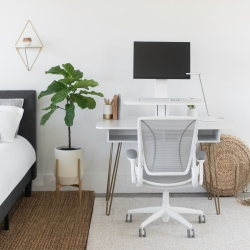July 24, 2020
Search Results for: working from home
July 16, 2020
Flexible working set to double once pandemic crisis is over
by Neil Franklin • Flexible working, News
 New research from the CIPD claims that employers now expect the proportion of people working from home on a regular basis will increase to 37 percent compared to 18 percent before the pandemic. Employers also expect the proportion of staff who work from home all the time to rise to 22 percent post pandemic compared to 9 percent before lockdown measures started to be imposed. More →
New research from the CIPD claims that employers now expect the proportion of people working from home on a regular basis will increase to 37 percent compared to 18 percent before the pandemic. Employers also expect the proportion of staff who work from home all the time to rise to 22 percent post pandemic compared to 9 percent before lockdown measures started to be imposed. More →
July 16, 2020
People do more work at home but increasingly worried about cost
by Neil Franklin • Flexible working, News
 A new survey from Lenovo claims that nearly two-thirds (63 percent) of people feel they are more productive working from home than when they were in the office and half (48 percent) believe they will continue to work from home more than they did. However, the report also suggests that two thirds of UK employees said they had to purchase new technology themselves to work effectively, spending an average of £271 to upgrade or improve technology while working at home. More →
A new survey from Lenovo claims that nearly two-thirds (63 percent) of people feel they are more productive working from home than when they were in the office and half (48 percent) believe they will continue to work from home more than they did. However, the report also suggests that two thirds of UK employees said they had to purchase new technology themselves to work effectively, spending an average of £271 to upgrade or improve technology while working at home. More →
July 6, 2020
Remote working productivity will slump as firms burn up their social capital
by Neil Franklin • Flexible working, News, Wellbeing, Workplace
 Employers are walking into remote working productivity slump, as people lose their visibility in an organisation, a new report claims. The survey from workplace software business Names & Faces claims that three quarters (75 percent) of people who report being more productive since working from home already know at least half of their company but that two thirds of people who don’t feel visible within their organisation have experienced a productivity drop while working from home. More →
Employers are walking into remote working productivity slump, as people lose their visibility in an organisation, a new report claims. The survey from workplace software business Names & Faces claims that three quarters (75 percent) of people who report being more productive since working from home already know at least half of their company but that two thirds of people who don’t feel visible within their organisation have experienced a productivity drop while working from home. More →
July 1, 2020
UK workforce wants hybrid-working, not the end of the office
by Neil Franklin • Flexible working, News
 The majority (77 percent) of UK employees say a mix of office-based and remote working is the best way forward post COVID-19, according to new research by the Adecco Group UK and Ireland. The global ‘Resetting Normal: Defining the New Era of Work’ study, which surveyed 1,000 UK employees alongside workers in eight other countries to understand their desires and expectations for the world of work post COVID-19, found that 79 percent think it’s important that their company implements more flexibility in how and where staff can work. More →
The majority (77 percent) of UK employees say a mix of office-based and remote working is the best way forward post COVID-19, according to new research by the Adecco Group UK and Ireland. The global ‘Resetting Normal: Defining the New Era of Work’ study, which surveyed 1,000 UK employees alongside workers in eight other countries to understand their desires and expectations for the world of work post COVID-19, found that 79 percent think it’s important that their company implements more flexibility in how and where staff can work. More →
June 26, 2020
Work from home advocates beckon us to a living hell
by James Woudhuysen • Comment, Flexible working, Wellbeing
 Look, I work from home. The liberal in me says: if you want to and can work from home, then why not? Yes, few of Britain’s cramped homes – especially those occupied by young people – are well equipped for home working, which can be stressful. But, as I say, I see no problem in working from home if you choose to. It’s one thing to say people should be free to work from home (WFH). It’s quite another to endorse it as the New Normal, the way to go, and as a path to a low-pollution, low-emissions paradise on Earth, as many are now doing. More →
Look, I work from home. The liberal in me says: if you want to and can work from home, then why not? Yes, few of Britain’s cramped homes – especially those occupied by young people – are well equipped for home working, which can be stressful. But, as I say, I see no problem in working from home if you choose to. It’s one thing to say people should be free to work from home (WFH). It’s quite another to endorse it as the New Normal, the way to go, and as a path to a low-pollution, low-emissions paradise on Earth, as many are now doing. More →
June 26, 2020
Obo becomes the UK distribution partner for Gustav agile working office toolbox
by Freddie Steele • Company news
 Workplace advisor, obo, has become the U.K. distribution partner for Gustav, the award-winning, office toolbox for agile working. The first ergonomic and portable solution of its kind, Gustav allows users to carry their workspace with them wherever they go – whether you are working from home or in an office. Light, beautifully-designed and with capacity to hold all the work essentials anyone needs, it also doubles as a laptop stand. More →
Workplace advisor, obo, has become the U.K. distribution partner for Gustav, the award-winning, office toolbox for agile working. The first ergonomic and portable solution of its kind, Gustav allows users to carry their workspace with them wherever they go – whether you are working from home or in an office. Light, beautifully-designed and with capacity to hold all the work essentials anyone needs, it also doubles as a laptop stand. More →
June 19, 2020
Working parents and carers call for more flexible working post-COVID
by George Eltringham • Flexible working, News
 New figures published today claim that more than 9 in 10 working parents and carers surveyed by work-life balance charity Working Families want their workplace to retain flexible working post-COVID-19. More →
New figures published today claim that more than 9 in 10 working parents and carers surveyed by work-life balance charity Working Families want their workplace to retain flexible working post-COVID-19. More →
June 5, 2020
Latest issue of IN Magazine heralds new era for working life
by Mark Eltringham • Features, IN Magazine
 The partial return to the physical world of work means that the print edition of the June 2020 issue of IN Magazine is now being mailed out. It has been available for a couple of weeks as a digital edition and it’s full of great stuff on the work topics that matter more than ever. We would say that but you can judge for yourself. More →
The partial return to the physical world of work means that the print edition of the June 2020 issue of IN Magazine is now being mailed out. It has been available for a couple of weeks as a digital edition and it’s full of great stuff on the work topics that matter more than ever. We would say that but you can judge for yourself. More →
June 2, 2020
Working life set to become more precarious and unequal
by Neil Franklin • News, Working culture, Working lives
 The future of work is likely to be even more precarious and unequal, according to a new research review from academics at Durham University Business School, Kings College Business School and University Paris-Dauphine. Dr. Jeremy Aroles, Assistant Professor in Organisation Studies at Durham University Business School, alongside colleagues, Dr. Nathalie Mitev (King’s College) and Professor François?Xavier de Vaujany (University Paris-Dauphine), reviewed a wide range of research related to working life new work practices and summarised this into a number of predictions for the future of work. This research review paper was published in the journal ‘New Technology, Work and Employment’, which is open access throughout June. More →
The future of work is likely to be even more precarious and unequal, according to a new research review from academics at Durham University Business School, Kings College Business School and University Paris-Dauphine. Dr. Jeremy Aroles, Assistant Professor in Organisation Studies at Durham University Business School, alongside colleagues, Dr. Nathalie Mitev (King’s College) and Professor François?Xavier de Vaujany (University Paris-Dauphine), reviewed a wide range of research related to working life new work practices and summarised this into a number of predictions for the future of work. This research review paper was published in the journal ‘New Technology, Work and Employment’, which is open access throughout June. More →











 According to research conducted by conference call provider
According to research conducted by conference call provider 














July 17, 2020
Your working day is never finished, merely abandoned
by Mark Eltringham • Comment, Flexible working, Technology